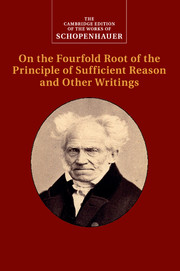Book contents
- Frontmatter
- Contents
- General Editor’s Preface
- Editorial Notes and References
- Introduction
- Notes on Text and Translation
- Chronology
- Bibliography
- Collation of the Two Editions of On the Fourfold Root
- 1 On the Fourfold Root of the Principle of Sufficient Reason
- 2 On Vision and Colours
- 3 On Will in Nature
- Glossary of Names
- Index
Introduction
Published online by Cambridge University Press: 30 June 2022
- Frontmatter
- Contents
- General Editor’s Preface
- Editorial Notes and References
- Introduction
- Notes on Text and Translation
- Chronology
- Bibliography
- Collation of the Two Editions of On the Fourfold Root
- 1 On the Fourfold Root of the Principle of Sufficient Reason
- 2 On Vision and Colours
- 3 On Will in Nature
- Glossary of Names
- Index
Summary
ON THE FOURFOLD ROOT OF THE PRINCIPLE OF SUFFICIENT REASON
Genesis of the work
On the Fourfold Root of the Principle of Sufficient Reason began life as Schopenhauer's dissertation. In his dissertation, Schopenhauer begins with a general statement of the principle of sufficient reason: ‘nothing is without a ground for its being rather than not being.’ Schopenhauer argues that the principle is derived from four different ground-consequent relations, what he calls the four ‘roots’ of the principle. He argues that previous philosophers recognized and conflated two of these roots: that in order for a proposition to be true it must have a reason and that any alteration of a real object must have a cause. The former Schopenhauer called ‘the principle of sufficient reason of knowing’ and the latter he called ‘the principle of sufficient reason of becoming’. Schopenhauer argues for recognition of two more roots that he refers to as ‘the principle of sufficient reason of being’ and ‘the principle of sufficient reason of acting’. Schopenhauer believed that were philosophers carefully to specify to which of the four different forms of the principle of sufficient reason they refer, they would be spared a great deal of confusion.
Schopenhauer had planned to submit the dissertation to the University of Berlin for his doctorate in philosophy. Instead he sent it to theUniversity of Jena. His change of plan was a function of circumstance. After two years at the University of Göttingen, he switched his allegiance from medicine to philosophy due to the influence of his first philosophy professor, Gottlob Ernst Schulze. In 1811 Schopenhauer enrolled at Berlin, drawn there with the hope that in Johann Gottlieb Fichte he would hear a great philosopher. But after his a priori veneration for Fichte had turn to disdain, and after fearing that Berlin would be attacked by Napoleon, in May 1813 he fled to Weimar, and then travelled south to the small town of Rudolstadt, where he laboured on his dissertation from July to the end of September. Fearing that sending his dissertation to Berlin could make it a casualty of the war, on 24 September he sent it to the nearby University of Jena, after paying the required examination fee.
- Type
- Chapter
- Information
- Schopenhauer: On the Fourfold Root of the Principle of Sufficient Reason and Other Writings , pp. xii - livPublisher: Cambridge University PressPrint publication year: 2012

